|
|
|
Sort Order |
|
|
|
Items / Page
|
|
|
|
|
|
|
| Srl | Item |
| 1 |
ID:
118738
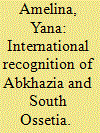

|
|
|
|
|
| Publication |
2012.
|
| Summary/Abstract |
The August 2008 war and recognition, on 26 August, 2008, of the independence of the Republic of Abkhazia and the Republic of South Ossetia by the Russian Federation and, later, by several other countries created a new situation in the Greater Caucasus, which many of the regional and world geopolitical players have found unpalatable. Their active efforts to change the new reality run up against the recognition of independence of these two states, which Russia cannot revoke without losing its international prestige and influence in the Caucasus right up to possible secession of the Northern Caucasus. The above-mentioned players have no choice but to use force to liquidate the republics of South Ossetia and Abkhazia; if this happens, complete and final destabilization of the Caucasus will be inevitable.
|
|
|
|
|
|
|
|
|
|
|
|
|
|
|
|
| 2 |
ID:
121431
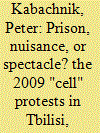

|
|
|
|
|
| Publication |
2013.
|
| Summary/Abstract |
For over three months in 2009 demonstrations took place in front of the Georgian Parliament on Rustaveli Avenue in Tbilisi, the capital of the Republic of Georgia. The protest involved a unique production of urban space as makeshift prison "cells" were placed in the landscape. The cells emerged following calls by the host of a popular reality television show, Cell #5. In order to illustrate the multiple meanings that people have of terrains of resistance, I highlight three dominant associations that people attributed to the cells: the prison metaphor; a public nuisance; and a spectacle. This case clearly exemplifies how popular culture will not only impact people's geopolitical understandings of the world but can directly alter the landscape and transform and encourage oppositional politics in a direct and immediate manner.
|
|
|
|
|
|
|
|
|
|
|
|
|
|
|
|
| 3 |
ID:
118766
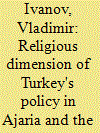

|
|
|
| 4 |
ID:
191074
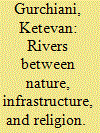

|
|
|
|
|
| Summary/Abstract |
Focusing on the domestication and undomestication of nature around the River Vere in Tbilisi, Georgia, this article analyses how modernization projects seemingly overcoming nature simultaneously reinforced the complex entanglement between nature and infrastructure, the material and immaterial, the human and non-human. The article centres around a flooding event in 2015, shedding light on the entanglement of different approaches and temporalities. The river and its infrastructure are caught up with ideas, beliefs and materialities. The paper analyses how the crisis gave rise to questions about ‘morality’ of materiality, ‘proper’ and ‘improper’ handling of nature. Based on ethnography and archival work, it shows how the infrastructural developments conceived as projects of Soviet atheist modernity emerged as sites where nature, technologies and religion meet. Rather than looking at Soviet and post-Soviet as two different modernities, the article shows them as continuities.
|
|
|
|
|
|
|
|
|
|
|
|
|
|
|
|
| 5 |
ID:
110935


|
|
|
|
|
| Publication |
2011.
|
| Summary/Abstract |
This is the report of the first ever visit by the Society to the Caucasus region, specifically to Georgia and then Armenia. The main historical focus was on their churches and monasteries and the development of Christianity, often against the odds, following its introduction to both countries in the 4th c A.D. The 23 strong party went first to Tbilisi, the capital of Georgia before making visits to a number of monasteries and towns including Gori, Stalin's birthplace, and Kasbegi. In Armenia the tour started at Lake Sevan, then visited several other destinations before finally reaching the capital Yerevan.
|
|
|
|
|
|
|
|
|
|
|
|
|
|
|
|
| 6 |
ID:
190820
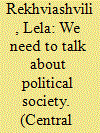

|
|
|
|
|
| Summary/Abstract |
This article points out the need to talk about the political society, or the politics and resistances, of subaltern groups in Eastern Europe and Eurasia. Existing literature frames diversity marginalized struggles as civil society struggles or decries the weakness of donor-driven, disembedded civil societies, reproducing the understanding of political life in the region in terms of absences, voids and deficiencies. Challenging this subsumption or dismissal of subaltern struggles, I advance two arguments. First, I argue against broadening the civil society concept to include various subaltern struggles as this approach risks overwriting differences between those groups that mobilize as rights-bearing citizens and the ones that are not recognized or treated as civil society. Instead, I propose acknowledging the historically and spatially contingent character of civil society and the defining role of the state and other actors in shaping which struggles fall within or beyond institutional and discursive frameworks of legality and legitimacy. Second, I argue that Patra Chatterjee’s concept of ‘political society’ can serve better as a meta-vocabulary to account for a diversity of struggles shunted as backwards, premodern and uncivilized, and to refocus research from what is absent to what is present, towards understanding counter-hegemonic discourses and practices.
|
|
|
|
|
|
|
|
|
|
|
|
|
|
|
|
| 7 |
ID:
122110
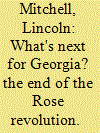

|
|
|
|
|
| Publication |
2013.
|
| Summary/Abstract |
On the evening of October 1st, only a few minutes after the polls closed for the parliamentary elections, Tbilisi and other Georgian cities were the sites of widespread celebrations of the type usually reserved for major political upheavals and victories over Russia in soccer or rugby. Cars honked their horns while waving the blue-and-gold flag of the Georgian Dream party; thousands of people clogging the streets were yelling enthusiastically. Georgian Dream was already staging a large victory rally on Tbilisi's Freedom Square on the basis of an exit poll done by a major American polling firm that showed their candidates leading those of the government's United National Movement (UNM) party by a margin of roughly two to one, which meant that President Mikheil Saakashvili had been defeated at the polls and that a major change had come to Georgia.
|
|
|
|
|
|
|
|
|
|
|
|
|
|
|
|
|
|
|
|
|